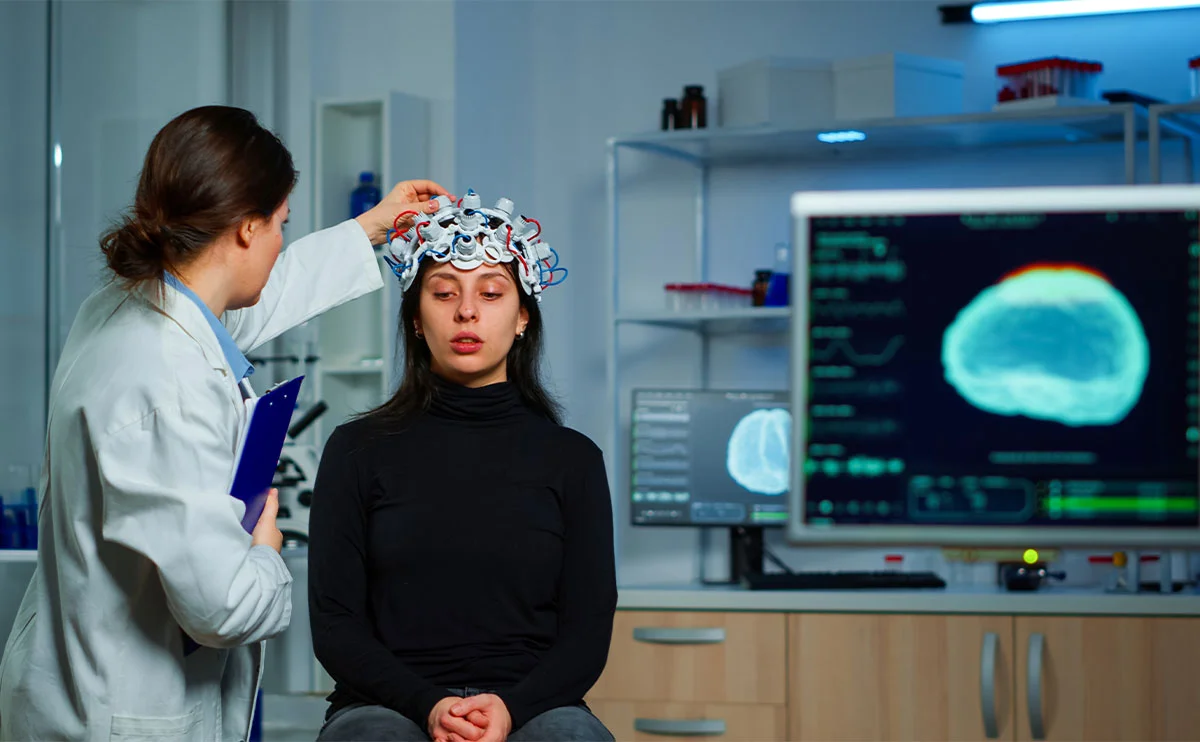Autism spectrum disorder (ASD) is a neurodevelopmental condition characterized by difficulties in social interaction, communication, and behavior. Various treatment methods are applied to improve the quality of life of individuals with autism. One of these methods is Neurofeedback therapy, which has become increasingly popular in recent years. So, is neurofeedback really effective in autism? In this article, we will discuss the potential benefits of neurofeedback in autism and Specialist Dr. Gökçen Hatipoğlu’s expertise in this field.
What is Neurofeedback?
Neurofeedback is a biofeedback method that monitors and regulates brain waves in real time. This therapy is based on the principle of analyzing brain activity using EEG (electroencephalography) devices and optimizing these activities. Neurofeedback is used especially in the treatment of attention deficit, anxiety disorders, migraines and neurological disorders. What about autism?
The Role of Neurofeedback in Autism Spectrum Disorder
How is Neurofeedback Used in Autism?
For individuals with autism spectrum disorder, neurofeedback can help relieve various symptoms by regulating brain waves. Here are the potential benefits of neurofeedback for autism:
- Development of Social Interaction and Communication Skills:
Individuals with autism may have difficulty perceiving and interpreting social cues. Neurofeedback can help improve social interaction and communication skills by regulating brain waves. - Reduction of Repetitive Behaviors:
Repetitive behaviors, which are common in autism, can be reduced with neurofeedback. This therapy helps a person exhibit more flexible and adaptable behaviors by regulating brain activity. - Decreased Sensory Sensitivities:
Individuals with autism may be overly sensitive to sensory stimuli. Neurofeedback can help reduce these sensitivities by regulating sensory responses. - Increased Attention and Concentration:
Attention deficit and hyperactivity are common in individuals with autism. Neurofeedback can help increase attention span and concentration. - Development of Emotion Regulation Skills:
Individuals with autism may have difficulty understanding and interpreting emotional expressions. Neurofeedback can help improve emotion regulation skills.
Who is Neurofeedback Suitable For?
Neurofeedback treatment may be an option for individuals who have been diagnosed with autism and have not benefited sufficiently from other treatment methods. However, it should be noted that it may not be suitable for every individual. Therefore, a specialist evaluation should be made before starting neurofeedback treatment.
How Does Neurofeedback Treatment Work?
- Evaluation:
Before starting therapy, the client’s condition is evaluated in detail by a specialist physician. At this stage, it is determined whether neurofeedback is appropriate. - EEG Measurement:
The client’s brain waves are measured using an EEG device. This measurement shows how brain activity is working and helps create a treatment plan. - Treatment Plan:
Based on the data obtained, a personalized treatment plan is prepared for the client. This plan is shaped according to the client’s needs and goals. - Sessions:
During the therapy process, the client attends sessions at regular intervals. During these sessions, the client learns to control brain waves and tries to regulate targeted brain activities.
Who is Specialist Dr. Gökçen Hatipoğlu?
Specialist Dr. Gökçen Hatipoğlu graduated from Dokuz Eylül University Faculty of Medicine in 2015. She completed her specialization training at Akdeniz University Faculty of Medicine, Department of Neurology between 2016-2020.
In her private practice located on Bağdat Street, Istanbul; she provides services in the diagnosis and treatment of dementia, senile dementia, Alzheimer’s, Parkinson’s, tremors, movement disorders, muscle disorders, headache, migraine, neuropathic pain, epilepsy, seizures, stroke, paralysis, sleep disorders, sleep apnea, narcolepsy and other neurological diseases.
Dr. Hatipoğlu aims to increase the quality of life of her patients with modern and effective treatment methods, including neurofeedback therapy. As an educated, experienced and expert physician in her field, she provides reliable and high-quality service to her clients.
What You Need to Know About Neurofeedback
- Neurofeedback is a long and patient process. Treatment results usually start to appear after a few sessions.
- Neurofeedback sessions must be performed by a qualified healthcare professional.
- More research is needed on the effectiveness of neurofeedback.
- It may not be a suitable treatment method for every individual and in some cases side effects may occur.
Neurofeedback is a treatment method that can help alleviate various symptoms in individuals with autism spectrum disorders. However, a specialist evaluation should be made before starting this therapy.
As a physician experienced in neurofeedback and other neurological treatments, Specialist Dr. Gökçen Hatipoğlu offers effective solutions to improve the quality of life of individuals with autism.
For more information about autism and neurofeedback or to make an appointment, you can contact Specialist Dr. Gökçen Hatipoğlu neurology office. Remember, choosing the right treatment and the right specialist is the key to a healthy life!

